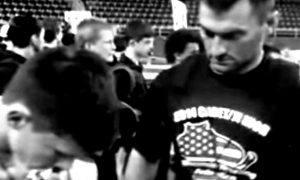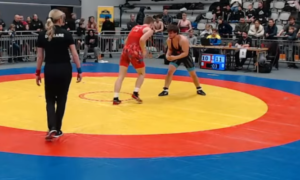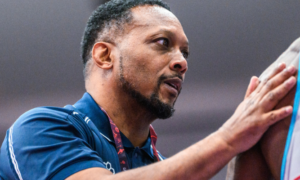The 2017 U23 Greco-Roman World Championships, held at the Artega Arena in Bydgoszcz, Poland, was initially seen as a potential high-profile showcase of what the US Greco-Roman program has waiting for the rest of the planet over the next few years. It’s no secret that the country’s youth is considered its biggest strength in this style currently, and with a squad that offered several athletes who possess glimmering credentials, fans were understandably confident that the end result following two days of wrestling would yield a boastful harvest of standout performances.
When the first day of action wrapped without a single Team USA representative earning a win, that confidence turned to tension. Now, after a second morning of competition that too fell short of expectations, any tension previously felt has turned into confusion. In a way, that’s not a bad thing. Expectation is the price paid for progress. But it is also why there is a heavy air of disappointment surrounding the events from earlier this morning.
Sancho
Recognized for his consistent track record when facing off against international competition, Alex Sancho (66 kg, NYAC/OTS) was unquestionably one of Team USA’s biggest medal hopes entering the U23 World Championships. As the wrestler going first for the group on Wednesday morning, Sancho’s bout with Belarusian Yury Kankov didn’t necessarily hold the responsibility of setting the tone, but it did wind up, unfortunately, as a portend of things to come.
A flourish of energy arrived with Sancho when the whistle blew for the start of the 66 kilogram qualification round opposite Kankov as the two wrestlers jockeyed for position in the center of the mat. Sancho initially opted for a high left overhook as Kankov dug in with an underhook, but they pummeled out of the position and reset. A passivity warning on Sancho rang in and Kankov would pick up his point shortly thereafter. An open-style wrestler, Sancho likes constant contact, but without being bogged down in the ties. He tried fighting his way into a more workable position and Kankov bit back, allowing both wrestlers a glimpse at scoring chances as the first period grinded to a halt.
It was Sancho who broke the ice in the second frame, clambering inside for a bodylock. But as he went to take it over, Kankov adjusted to land on top to pick up two points before transitioning to a gut that scored two more. Down 5-0, Sancho had to get moving, and quick. He was fighting, feinting, doing whatever he could to shake Kankov up. A window of opportunity presented itself when Sancho exposed Kankov only to see the tables turn in an instant, making the score 7-2 in favor of Kankov, which was the final score.
Kankov was clipped by Gaoquan Zhang (CHN) in the round-of-16 to end Sancho’s bid for medal contention.
Roberts
Competing in his third World Championships event was Roberts and with the steps he has taken the past two years, his presence at this tournament offered a heightened sense of optimism. No longer just a wiry, fresh-faced prospect, the NMU student has transformed into a battle-hardened competitor who displays improvement almost every time out. But in order to stamp down his place among the the top names in this age group, he needed to get off to a fast start. And that he did.
Roberts’s qualification round opponent was no cookie. In fact, if this bout took place a year ago, the American would have been a sizable underdog. In Zoltan Levai (SVK), Roberts had himself a former Junior World bronze medalist sporting a complete skill-set and plenty of high-level experience. That wouldn’t be enough for Levai to save him from what was about to happen.
At the whistle, it was attack time for both combatants. Ferocious exchanges marked the opening of the bout with Roberts coming close on two front headlock attempts that Levai gritted out of. A lot of times when it comes to Roberts it has been about his size, and while Levai was certainly the thicker of the two, it was Roberts asserting his will. That being said, Levai was curiously the beneficiary of the first passive point, though Roberts’s own activity evened it out just as the first period came to its conclusion.
A more measured pace started the second with Roberts assuming command following an apparent Levai arm spin attempt. He had collapsed on top of the Slovakian and appeared very close to netting two, only the points never came. Back up they were with Roberts pressuring forward. An overhook by Roberts brought Levai briefly to his knees, but he bounded up. From an underhook-and-wrist tie, Roberts dipped down into a nasty duck-under, collecting two points. Roberts then worked a head-lever he was able to convert into a trap-arm gut. He rolled Levai right over for the exposure, but he didn’t stop there. Roberts, now chest-to-chest on top, kept the lock and held on, sticking Levai for the fall with a minute remaining in the bout to move into the next round.
Aidos Sultangali (KAZ) represented another hurdle. A champ as both a Cadet and Junior at the Asian Championships previously, Sultangali is an opportunistic machine capable of grabbing points from a variety of positions. What’s more, he doesn’t stick to the more classical methods of operation commonly found on that side of the globe. It made for an exciting follow-up test for Roberts but one that ultimately did not go his way.
Roberts clashed in right away and latched onto an arm throw that slipped. They reset to joust towards the edge with both athletes marching to a brisk beat. Roberts snared a front headlock to swoop behind and nearly collect two, but Sultangali ambled away and gathered his bearing. Back on the feet and Sultangali seemed flustered, although that did not preclude him from being gifted a passive point. Roberts, as he is wont to do, upped the pressure and crashed in. This might have been the pivotal juncture of the proceedings. As Roberts clawed a distant underhook and torqued, Sultangali went with the momentum and hipped Roberts to his back for four points.
A fall appeared imminent with Roberts having no choice but to bridge out. Even as he did, Sultangali still owned a head-arm lock around Roberts’s head, leaving the American vulnerable to a front headlock dump the Kazakhstan wrestler pulled over for two more, plus a step-out when Roberts returned to his feet. It was a brutal sequence from a US perspective and can be credited with deciding the match.
Roberts wasn’t done, however. :15 into the second period, he surged back after a duck under led to a bodylock he used to expose Sultangali off the edge. Only down by two, it was as if he had found new life entering the homestretch. That momentum was disrupted roughly :40 later. Roberts had once again changed levels. The problem was that Sultangali, while holding an underhook, off-balanced Roberts for two. Another pair of points went Sultangali’s way when he hustled behind for a takedown with :90 left. Roberts didn’t panic or retreat. Instead, he bit down and fought to create any openings he could to somehow narrow the gap. Alas, Sultangali managed to remain upright the rest of the way en-route to a 10-4 decision.
Sultangali advanced to the 59 kilogram semifinals but was defeated by 2015 Junior World bronze medalist Masuto Kawana (JPN) in controversial fashion to eliminate Roberts from contention in the repechage bracket.
Bey
2017 Junior World Champion Kamal Bey (Sunkist) was strolling into the U23 Worlds with a new weight class while also shouldering the highest expectations of anyone else on the US team. That’s part of his life now and with how he performed at the U23 Trials, fans were justifiably excited about his chances in Poland. Whether it was the higher weight, the quality of opponent, or both, all anyone knows for sure is that the way Bey’s tournament came to an abrupt end will be considered one of the bigger and more unpleasant surprises for Team USA over the past two days of competition.
Matched up with 2013 Junior World silver Andrei Antoniuk, Bey, perhaps naturally, wanted to set the tone right away that this was going to be a different kind of battle than the Ukrainian was used to. Bey worked to Antoniuk’s right to start off, chipping in with some brief hand-fighting before flashing a short drag about. Antonik boarded his elbows in and then was able to sneak an underhook. A passive warning came Bey’s way as the two jostled near the edge. Bey clamped up high — but so did Antoniuk — and he four’ed Bey with a bodylock on the boundary to jump ahead 4-0.
Four points is hardly a deficit given Bey’s high-scoring, risk-taking style, so after the restart, there was not a drop of trepidation as to what might unfold next. He prowled in and began stalking, plenty of time still read on the clock in the first for something big. But Antoniuk met the pressure by collapsing the tie-ups inside as the opening period ticked to its end.
A more purposeful Bey came out for the second and he right away turned on the jets, forcing the action and briefly backing Antoniuk up on his heels. It’s usually a highly-effective strategy for the Illinois native, but it wasn’t here, as Antoniuk ducked under a charging Bey to scamper behind for two. Antoniuk then immediately went to lock and lift. As he did so, Bey was called for a leg foul, resulting in a caution-and-two. The whole sequence, the whole scene, it was just bizarre. Left with practically no other options, the US side challenged the sequence and lost. Antoniuk earns the stunning 9-0 tech fall win, simultaneously ruining Bey’s quest for back-to-back World titles.
2015 Senior/two-time Junior World bronze medalist Lasha Gobadze (GEO) got past Antoniuk 4-0 in the quarterfinals, ending Bey’s tournament altogether.
Hancock
Right along with Bey, Hancock is also up a weight class, though his jump is far more dramatic — 32 kilos. The 2016 Junior World bronze medalist was a rather large 98 kilogram competitor, especially at the age-group level. Even as a Senior, Hancock’s unique combination of size and speed has played an important role in a lot of his success thus far. Those attributes are certain to follow him to his new weight class eventually, as well, and Hancock’s decision to move up to 130 will very likely to prove to be the right one going forward in his career. Plus, the results have been encouraging. Counting the U23 Trials, Hancock’s record as a heavyweight was 4-0 entering competition on Wednesday.
It’s just that right now, Hancock probably wishes his Wednesday unfolded a little differently. That doesn’t mean he didn’t demonstrate flashes of brilliance. Hancock is simply too outstanding to ever appear underwater at events like this. Qualification-round opponent Lenny Berei (ROU) learned that firsthand.
Berei, outweighing Hancock by an estimated 20 kilos (or more), tried to uncork a headlock that the American deftly shucked and spun behind on. The sequence was ruled a slip, but it showed that Hancock is more than capable of fending off the attempts of his now-meatier opposition. But it is offense that matters, and Hancock delivered some after the restart by grabbing ahold of one of his patented bodylocks and taking it over for four. But it’s not like he skated. Berei bodied Hancock for a correct throw later on in the period and as Hancock tried to reciprocate, the Romanian covered on top for two more.
A little over two minutes remained in the bout when Berei used an attempted throw to garner a step-out point and a 5-4 advantage. Hancock would answer immediately. Following another reset, Hancock came in off the over-under clinch to slide Berei by for a takedown before rolling him over twice via gutwrench. The momentum had swung completely. Holding a cushiony 10-5 lead, all Hancock had to do was avoid a multi-point sequence or a five. Berei pressed in, leaning on the Colorado resident and seemingly wearing him down in the trenches. But Hancock stayed engaged and upright in earning the opening round decision victory.
2015 African Championships gold medalist Abdellatif Mohamed (EGY) offered a body as big as Berei, only with a more expansive arsenal at his disposal.
Hancock began this round-of-16 showdown by off-balancing Mohamed. For the moment, this seemed to be a good sign that he might be able to fluster the Egyptian with some pointed movement. The wrestlers retook the center of the mat ahead of an odd sequence. Mohamed shirked a tie-up to pressure forward and behind Hancock, who was then penalized for two after backing up out of bounds. Any rhythm Hancock may had up until then had disappeared. A passivity point soon followed, giving Mohamed a 3-0 lead.
Mohamed next pressured his way into a bodylock and arched Hancock off the edge for four and a commanding 7-0 advantage. The pace that was being set was not a plodding one by any stretch. Both wrestlers were fighting for position, but it did appear like Mohamed was the more confident of the two. After a reset, they resumed tussling inside as Mohamed pushed forward. Hancock was called for a step-out, but the US challenged — and won — only, it was all for naught. For upon yet another restart, Mohamed pressured in again, putting Hancock back on his heels and off the line for the match-ending point.
Iran’s Amin Mirzazadeh defeated Mohamed in the quarterfinals to eliminate Hancock from competing for a bronze medal.
We will have follow-up coverage of the U23 Worlds throughout the week, so stay tuned!
2017 U23 GRECO-ROMAN WORLD CHAMPIONSHIPS
DAY 2 TEAM USA RESULTS
59 kg: Dalton Roberts (NYAC/OTS)
WIN Zoltan Levai (SVK) via fall (5:00)
LOSS Aidos Sultangali (KAZ) 10-4
66 kg: Alex Sancho (NYAC/OTS)
LOSS Yury Kankov (BLR) 7-2
80 kg: Kamal Bey (Sunkist)
LOSS Andrei Antoniuk (UKR) 9-0, TF
130 kg: G’Angelo Hancock (Sunkist)
WIN Lenny Berei (ROU) 10-5
LOSS Abdellatif Mohamed (EGY) 8-0, TF
CLICK HERE TO DONATE TO THE USA GRECO-ROMAN PROGRAM
Listen to “5PM10: Olympic and World Teamer Ellis Coleman” on Spreaker.
SUBSCRIBE TO THE FIVE POINT MOVE PODCAST
iTunes | Stitcher | Spreaker | Google Play Music | RSS


















